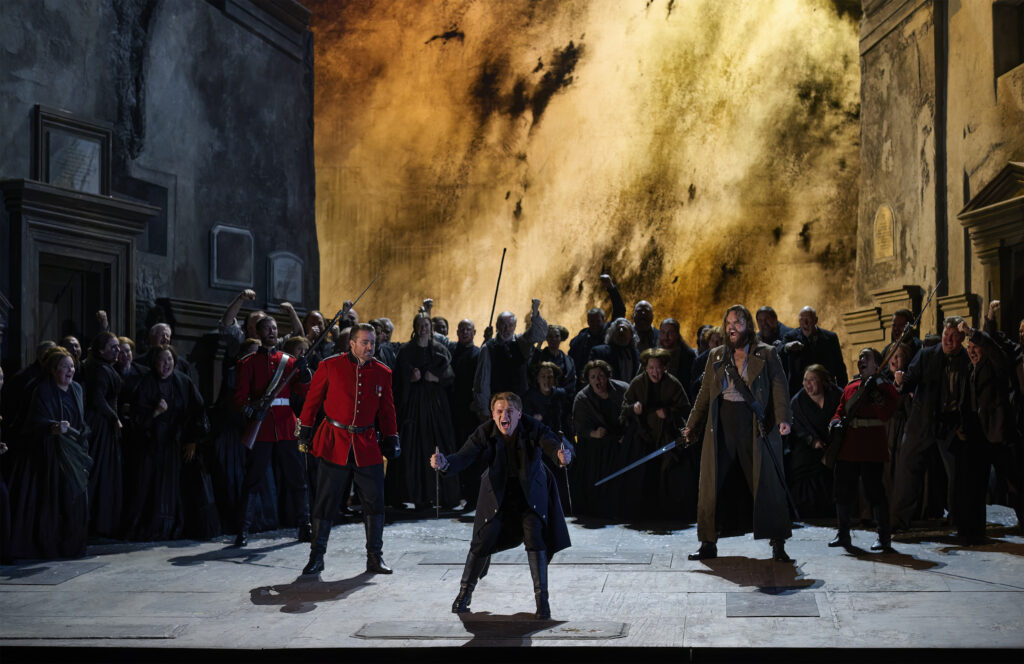Mi si affaccia un pugnal!/L’elsa a me volta?/… Mio pensier la dà forma, e come vera.
“Is this a dagger I see before me?/The hilt turned to me?/… My thoughts give it form and make it real.”
Macbeth, Verdi’s ferocious 4-act opera first presented in 1847, like Shakespeare’s darkly roiling tragedy before it, is as much a carefully gauged study of the Elizabethan consequences of raging free will as it is a deep, blood-drenched dive into the timeless dynamics of power and ambition. The perception of evil, albeit monstrous to those who oppose him, is, in Macbeth’s estimation, as necessary to his political intentions, however unconscionable his musings, as it is self-perpetuating. Lightning flashes. Heaven thunders. The natural order of kingship is defied. Duncan is slaughtered, the ancient chain of being severed by a single vicious act.
Set within the closeted precincts of a ragged barbaric clan — a roofless, shattered chapel turned soulless baronial hall turned yawning sepulchre of ghouls and open graves, a godless domain of fire and destruction lying smouldering beyond — director David McVicar brings his incendiary, updated 19th century-flavoured vision of Verdi’s blazing Shakespearean tragedy to the Canadian Opera Company’s Four Seasons Centre, a savage requiem, bloody and brutal, for a not-so-distant land. War rages. The innocent suffer. Death fills the air. McVicar’s sprawling Macbeth contains all that we have come to know of global inhumanity in this, the eternal present.
Corresponding by letter with his collaborator, Francesco Maria Piave — a voluminous source of historical insight into his frequently strained relationship with the long-suffering librettist — Verdi noted that there were only three characters in Macbeth deserving of particularly acute narrative attentiveness: Macbeth, Lady Macbeth and the Witches.
Closely adhering to Shakespeare’s text, Macbeth, the opera, frames the ruthless thane in essentially classic terms — aberrant protagonist, fevered fantasist, slayer of goodness — Lady Macbeth’s insatiable need for influence and position similarly defined. The Witches, however, are altogether original character constructs, expanded in number from a trio of discrete practitioners of the black arts to an entire chorus of adherents. It is the women of Macbeth’s clan who collectively assume the role of sorceresses signalling the collapse of normalcy. Gathered in set designer John Macfarlane’s multi-purpose haunted church to practice their unsettling rituals, divided into three distinct vocal cohorts, Verdi’s agents of the occult become a congregation unto themselves. The threat of false belief overshadows the everyday. Reality is inverted. Children become, not emblems of innocence, but willing proxies of the resident coven, three startlingly young figures frequently factoring into the swirl of magic and chaos that is McVicar’s driving, disturbingly skewed Macbeth. A ghostly child puppet appears as part of a witchy sabbath. Macbeth cradles a dead newborn, very possibly his own — a crippling secret from a traumatic point in time, vaguely alluded to by Shakespeare in an early scene in his play.
Ti conforti la vendetta (“Let vengeance comfort you”), Malcolm declares to a shattered Macduff, his two small sons slain by Macbeth’s own hand. Non l’avró. Di figli è privo (“I cannot have it. He has no children”), replies Macduff flatly.
Children, McVicar seems to tell us, power existence, their absence consuming Macbeth’s demented thoughts.
Appearing in the title role, baritone Quinn Kelsey projects a strong, dramatic presence, clear-vowelled and open with top notes and ping aplenty. Macbeth’s final aria, Pietà, rispetto, amore (“Honour, respect, love”), a dazzling cavatina shimmering with contrition and regret, is delivered with supremely credible anguish, Kelsey positively soaring as Macbeth desperately reaches for salvation in the closing cadenza.
A season opener at Lyric Opera of Chicago in 2021, McVicar’s Macbeth was COC-scheduled to debut at the FSC with world soprano Sondra Radvanovsky reprising her much acclaimed appearance as Lady Macbeth this spring. Her subsequent need to cancel locally continues to be a source of much concern.
Singing the role on opening night, Alexandrina Pendatchanska tendered a taut, theatrically fraught portrayal of Shakespeare’s scheming noblewoman, steely and dynamic. Fellow soprano Liudmyla Monastyrska shares the assignment on several upcoming dates later in May.
Tenor Matthew Cairns contributes a showstopping Macduff, his weightless, ringing Italianate timbre, the ideal jumping off point for sensational leaps up and down the Romantic scale. Verdi’s heartbreaking, Ah, la paterna mano (“Alas, I wasn’t there to protect you, my darlings”), a showpiece aria of sweeping dimension, is dispatched with spectacular energy and expression, Cairns tearing at our emotions.
Bass Önay Köse is a fine, resonant Banquo. Bass-baritone Vartan Gabrielian sings The Doctor. Soprano Tracy Cantin partners as Lady-in-Waiting to Lady Macbeth. Tenor Adam Luther appears as Malcolm.
Performing with enormous dexterity and commitment, the men and women of the Canadian Opera Company Chorus provide innumerable moments of virtuosity, perhaps nowhere more abundantly on show than in their stirring rendering of Patria oppressa! (“Oppressed land of ours!”), a manifestly overt salute to Italian nationalists on Verdi’s part, thinly disguised as a lament for Scotland. The mirroring of the maestro’s rather more familiar patriotic anthem, Va, pensiero from Nabucco is as stylishly reflective as it is self-evident.
Macbeth is early Verdi, the product of sedici anni di galeria (“sixteen years in the galleys”) as he once remarked, a time of hard labour spent perfecting the use of grand musical gestures. Loosening the host of formulaic bel canto strictures that bound opera to older turn of the century conventions. Becoming, in a word, modern.
Conductor Speranza Scappucci lavishes great attention to both the essence and detail of Verdi’s remarkable progressive music, its power and lyricism, boldness and infinity of harmony. A profoundly sensitive reading of a particularly colourful score, played with meticulous clarity and flare by members of the always masterful Canadian Opera Company Orchestra.
All hail, Macbeth!
McVicar and company have conjured a timeless sensation.


